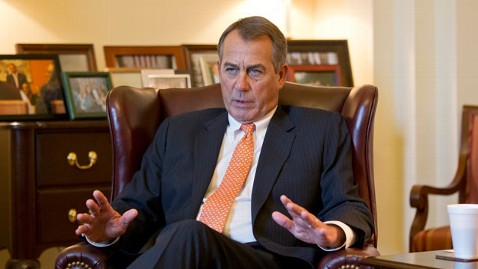Republicans Don't Budge After Obama Shames Congress on TV

J. Scott Applewhite/AP
The so-called sequester seems more unavoidable than ever as lawmakers enjoying a nine-day recess in the comfort of their districts watched President Obama shame them publicly on television, part of the president's effort to pressure Congress to strike a deal to delay the first wave of arbitrary spending cuts scheduled to hit at month's end.
The president today called on Congress to close tax loopholes to raise half the amount in a package of alternative savings to offset the sequester. But in a statement after the president's address, House Speaker John Boehner rejected his proposal and reiterated that any revenue achieved by closing loopholes should be utilized to lower individual rates via comprehensive tax overhaul, not to pay for more spending.
"Tax reform is a once-in-a generation opportunity to boost job creation in America," Boehner, R-Ohio, said. "It should not be squandered to enable more Washington spending. Spending is the problem, spending must be the focus."
With about $2.7 trillion in revenue in 2013 and about $3.8 trillion in spending, the $85 billion sequester cut this year represents a 2.2 percent reduction in spending in FY2013, or less than one-half of one percent of the growing $16.5 trillion federal debt.
Boehner also pointed out that the House passed legislation twice in the previous Congress that demonstrated how his party would replace across-the-board cuts. He has maintained that Senate Democrats should vote to pass their own plan before the House acts again.
House Minority Leader Nancy Pelosi criticized the GOP's strategy, saying that "America cannot afford more Republican obstruction and delay." She called on Republicans to come together with Democrats to "strengthen the middle class, create jobs, expand our economy and responsibly bring down the deficit."
"Republican inaction will simply leave the indiscriminate, across-the-board spending cuts in place, threatening jobs, undermining public safety and first responders, injecting uncertainty into our markets, and harming our economy," Pelosi, D-Calif., wrote in a statement. "The last thing we should do is nothing. The clock is ticking and the deadline is fast approaching.
Both chambers of Congress are out of session, and a solution before March 1 would require something that has become characteristic of Congress in the past three years of divided government: another last-minute agreement.
In August 2011, while the country's ability to honor its debt obligations hung in question, lawmakers came together to pass the Budget Control Act, which not only raised the debt ceiling and cut more than $1 trillion in the next decade, it also created the doomed Joint Select Committee on Deficit Reduction, also known as the Supercommittee, which ended its negotiations in a stalemate in November 2011.
Still, the sequester wasn't scheduled to take effect for 12 more months, leaving lawmakers plenty of leeway to find alternative savings. But after a two-month delay was the best on which Congress could agree as part of the Fiscal Cliff agreement, time is once again running short.
Even though Congress is in recess, lawmakers continue to mull the impact the cuts will have in their districts.
Freshman Rep. Cheri Bustos, D-Ill., and Illinois Republican Rep. Adam Kinzinger, who is serving in his second term in the House, will tour a local defense contractor together in Rockford this afternoon and discuss the effect "sequestration" could have there. Virginia Democratic Rep. Bobby Scott, who also represents a defense-heavy district, is holding a community forum on the economic effects of sequestration tonight in Newport News.
"Over the last year, I have heard from many of my constituents about how these unnecessary cuts will negatively impact their businesses," Scott said in a release announcing the discussion. "I share their concerns and I have urged my colleagues in Congress to make canceling sequestration our top priority."
The House of Representatives meets next for legislative business Feb. 25, beginning a four-day workweek that ends when sequestration takes hold March 1.
Today, one of the few Blue Dog Democrats remaining in the House, Rep. John Barrow, wrote a letter to the top congressional leadership asking them to reconvene the supercommittee in hope of finding bipartisan agreement to stall the sequester.
"Despite the failure of the super committee to accomplish their goals last Congress, I am hopeful that, having learned more about the dire consequences of the sequester, we have a new sense of urgency to succeed if given the chance," Barrow, D-Ga., wrote today. "I believe this is the most reasonable course of action and the most likely to be successful."
Michael Steel, press secretary to Speaker Boehner, rejected Barrow's proposition to reconvene the supercommittee, echoing the speaker's position that the burden to act is on Senate Democrats.
"The Joint Select Committee failed because Washington Democrats refused to accept a balanced approach of spending cuts and additional revenue, including closing the often-discussed corporate jets loophole," Steel wrote in an email.
"Today, we don't need another 'Super Committee.' We need Senate Democratic Leaders to come up with a bill that can actually pass the Senate, not more show votes and soundbites."